Terence Rattigan’s art of concealment is what makes The Deep Blue Sea so rich and true an observation of the way people behave. Being deprived of his concealing mask is the crucial idea of the interesting new play partnering it at Chichester to mark Rattigan's centenary: Nicholas Wright’s Rattigan’s Nijinsky, which incorporates an unproduced Rattigan TV script into a drama of why it was not produced.
The two plays, acutely directed for Chichester by Philip Franks, make illuminating contrast, too, purely in theatrical method - Rattigan’s straight-up focus on people in a room and the things either done or about to be done that have brought them there; Wright’s consciously manipulative physical interweaving of characters from the “present” and the “past”, actors doubling up in quick costume changes, much dashing through with time-shifting props, the stage in constant motion.
It proves, I think, that strong characters will always trump strong ideas in theatre - though you want both. Some descriptions of The Deep Blue Sea bring it across as a collection of Fifties stereotypes: the dissatisfied wife (Hedda Gabler meets Brief Encounter), the stuffy, safe husband, the adorable, dangerous lover, the enigmatic neighbour and so on, but Rattigan’s quartet of people is knit so close, and the concealments and disappointments in all of them are laid so subtly bare in this flawless ensemble, that all you need is an old sofa, tatty wallpaper and a gas fire, and you have your stage.
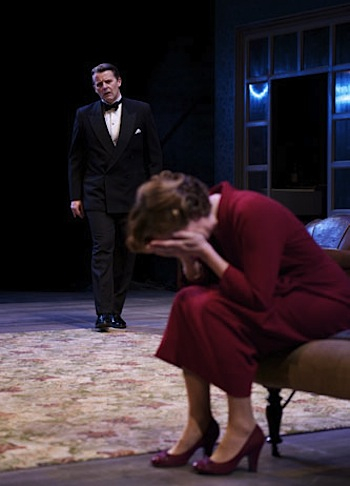 It happens on a single day, beginning with Hester Collyer’s attempted suicide. During the day’s almost farce-like irruption of visits to her ghastly Ladbroke Grove rented room by people checking her welfare she is presented with decisions by others that change her life: the lover closes the door on her, her husband opens the door back home for her, and there remains in the air her unfinished suicide attempt.
It happens on a single day, beginning with Hester Collyer’s attempted suicide. During the day’s almost farce-like irruption of visits to her ghastly Ladbroke Grove rented room by people checking her welfare she is presented with decisions by others that change her life: the lover closes the door on her, her husband opens the door back home for her, and there remains in the air her unfinished suicide attempt.
A flawless cast headed by Amanda Root’s heartrending Hester Collyer generates a seat-clutching dramatic suspense. In these performances, not one of the characters can be fully predicted: things unresolved and undecided, mistaken and deluded, all enrich and fulfil the reality, so that by the end you feel for every one of them that deserves your sympathy, and you know who doesn’t deserve sympathy.
Root is rare among actresses in her vocal ability to suggest an irresolute passivity, someone whose passion never finds a compass-bearing. Her body seems like a girl’s wearing a woman’s sophisticated clothes and high heels, she clumps about as if uncomfortably modelling someone else’s pattern. As she wavers between her sense that she needs to be crazy in love with the irresponsible Freddie and her conditioning to be comfortable and safe with her husband, one senses in this performance a woman imprisoned in her era, childless and therefore directionless. Without being at all an epic character, she manages to be tremendously significant somehow.
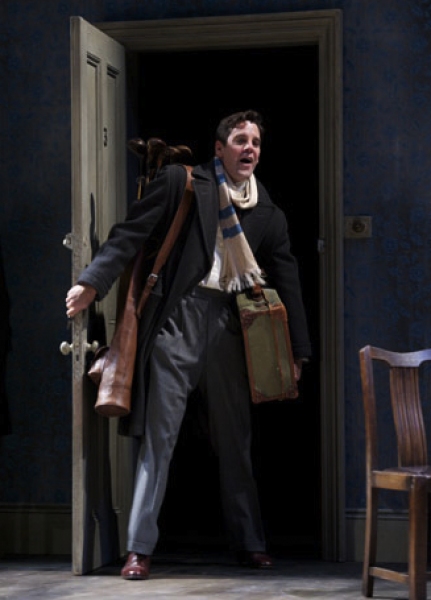 This comes across in Anthony Calf’s subtle performance as her husband, now an upright Sir and a judge, in whom one can still read traces of the kind young man who used to love life with his dear girl, before she became bewildered by her role and he stopped understanding her (Calf pictured above right, with Root). And one senses a cover-up also in John Hopkins’s dishy and loveable Freddie Page (pictured left), possibly a sexually confused man unable to reciprocate love as it's requested. Then, too, there is Mr Miller, the mysterious medic who is also not what he seems, in a notably still and layered performance by Pip Donaghy.
This comes across in Anthony Calf’s subtle performance as her husband, now an upright Sir and a judge, in whom one can still read traces of the kind young man who used to love life with his dear girl, before she became bewildered by her role and he stopped understanding her (Calf pictured above right, with Root). And one senses a cover-up also in John Hopkins’s dishy and loveable Freddie Page (pictured left), possibly a sexually confused man unable to reciprocate love as it's requested. Then, too, there is Mr Miller, the mysterious medic who is also not what he seems, in a notably still and layered performance by Pip Donaghy.
Behind all of these fences and defences burns Rattigan’s passionate understanding of a life led in disguise and imbalance. He was in his fifties before homosexuality was decriminalised, and like many gay creators of his generation (the choreographer Frederick Ashton was another) he poured his deep awareness of pain into his characters. In every one of the people in The Deep Blue Sea there is something much deeper, maybe not even acknowledged to themselves, going on under what's visible. The sea is eternally deeper than it looks. Bravo to a vividly moving cast and production of 60-year-old material. Urgent viewing required.
Even though several of the cast migrate into the Wright play, the fact that characters here have been drawn from newspaper cuttings and legend is too clear to make Rattigan’s Nijinsky an equal dramatic partner. Still, in a couple of scenes it shines with vivid modern character insight, and the staging is enjoyable enough in its sheer momentum.
Rattigan seems intrigued by Nijinsky’s apparent sexlessness, and Romola's almost inexplicable love for him
The story is that Rattigan in 1974 was commissioned by Cedric Messina of the BBC to write a dramatic script about Nijinsky, the miraculous and enigmatic young dancer of Diaghilev’s company, the Ballets Russes, who produced three bewildering pieces of choreography at a very young age (The Rite of Spring being the most famous) and then became mentally ill and was hospitalised. Wright sets forth to incorporate parts of this script into a new play as a dramatic exploration of why Rattigan pulled the script without explanation.
It’s quite hard to tell from the Nijinsky/Diaghilev parts how much of this is Rattigan, so alien is the tone at times from the sensitivity of The Deep Blue Sea. Characters speak as if in headlines updating each other with important recent events and name-checks; Pavlova, Fokine, Igor [Stravinsky]. Diaghilev says, “You have my personal guarantee,” every time he avoids a bill, like a spiv.
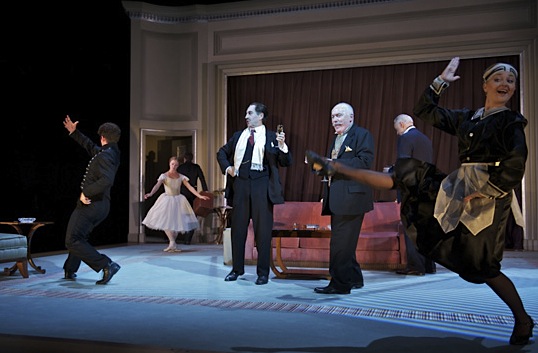
One assumes that Wright extracted what he needed from Rattigan's script to make his own play - and perhaps it really wasn't very good. All the same, the extracts suggest that Rattigan was attempting above all to understand Nijinsky’s sudden marriage to a company groupie called Romola, a catastrophic blow to the infatuated Diaghilev, and the end of his own sanity.
One gathers that Diaghilev paid Nijinsky nothing for his services, and yet the dancer, uneducated and rootless, felt entirely bound to him in gratitude, more artistic than sexual. But Nijinsky proposed, almost on first meeting, to a socialite who spoke languages he could not (he had Polish and Russian, she had Hungarian and French), whereupon the wounded and vengeful Diaghilev threw out all his iconoclastic ballets.
[bg|/THEATRE/ismene_brown/Rattigans_Nijinsky]
Pictured above © Manuel Harlan: Nijinsky (Joseph Drake), Faye Castelow (Romola), Jonathan Hyde (Diaghilev), Malcolm Sinclair (Rattigan)
The focus on the character of Romola is very Rattiganesque - as the character of Sir Terence created by Wright says, his speciality was always in female characters. Faye Castelow (who has a bit part in The Deep Blue Sea too) gives a captivating show as young Romola, with an innocence and indomitable loyalty in her relations with Nijinsky that reflects without the accretions of later historical prejudice upon her. And Wright too sees Romola as the pivot: in a superbly dramatic encounter, he has her, in old age, tell Rattigan that if he produces his script she will unmask Britain’s veteran theatrical knight as a gay “with bestial proclivities”. Rattigan, terminally ill, cannot bear this potential contamination of his legacy.
From this gripping confrontation of two people living different pretences - wonderfully acted by Malcolm Sinclair and Susan Tracy - Wright sets ripples going with plenty of psychological acuteness. In the ramshackle theatrical sketchiness of the construction some of the other character-playing I find alienating: actors who can’t dance playing Nijinsky and Tamara Karsavina, while Jonathan Hyde’s Diaghilev is played like an operetta buffa (is this Rattigan’s cynical reading or Wright’s?). Hyde is vastly better as the colourful TV mogul Messina.
However, one can sense why Rattigan was boldly prepared to take on such an iconic homosexual couple as Diaghilev and Nijinsky and yet argue that the story was not about that. He doesn’t appear much interested in Diaghilev as a character beyond the stereotypical theatrical poof impresario. He seems much more intrigued by Nijinsky’s apparent sexlessness, and Romola's almost inexplicable love for him.
And I also feel I understand why Wright wanted to grip this richly enigmatic idea and shake it about, even if it remains more a clever piece of theatrical gameplay than a fully finished character piece.
The festival's trailer for the two productions



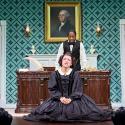

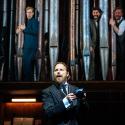

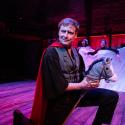
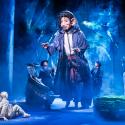
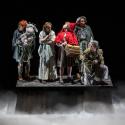
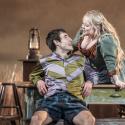

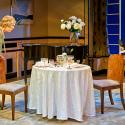
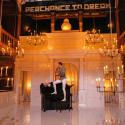
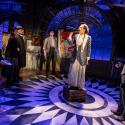
Add comment